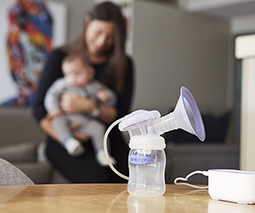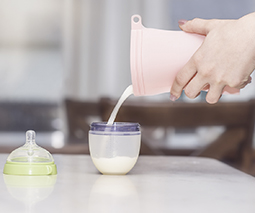Why the first six weeks of breastfeeding are the hardest

The first six weeks of breastfeeding is tough going. Learning to feed your baby, dealing with sore nipples and trying to figure out whether your little one is getting enough milk can make this time incredibly challenging.
It’s no surprise that when some mums get started with breastfeeding, they’re so shocked by how relentless and time-consuming it is that they wean much earlier than they had planned. Factor in breastfeeding struggles such as blocked ducts, cluster feeding and numerous night wakings for feeds, and it quickly snowballs into an overwhelming time for any new mum.
It gets easier
Here’s the thing you should know. The thing no one tells you about when you’re learning to breastfeed: the first six weeks are intense, but after that, it’s pretty much smooth sailing.
In fact, while lots of new families end up bottle feeding because they believe it to be easier, once you get past the first six weeks of learning, breastfeeding is actually the easier option, not the bottles.
Think about it – all those bottles you have to wash continually, and the constant preparation of new formula, not to mention the constant replenishing of formula tins.

Breastfeeding, on the other hand, starts off hard and gets easier. Once your supply is established and you know your baby is gaining weight, you’ll have ready-made, portable and free food for your baby whenever you need it. Bottle feeding may seem easier in the beginning, but it comes with ongoing work compared to breastfeeding.
Being informed is what counts
This is not about being pro-breastfeeding and anti-formula, but being informed about those intense first six weeks. Because knowing about them will make getting through those early weeks of breastfeeding that much easier. After all your hard work, you can finally sit back and relax while your body makes the milk your baby needs and you can enjoy feeling more in control.
Why early breastfeeding is so hard (and how it gets easier!)
Early breastfeeding is all about establishing your milk supply, so expect it to be labour intensive, which means feeding on demand, 24/7 while your baby helps your body figure out exactly how much milk to make. All this feeding behaviour can lead to the challenges that make this time so tough on new mums:
Sore and hard boobs
When your milk first comes in, you’ll notice your breasts becoming rock hard and very sore to touch, and this full feeling will continue to occur whenever a feed is due. But once you reach the six week mark, you’ll notice your breasts are a lot softer at feeding time. This is not a sign of a reduced milk supply, but a sign that your body has figured out exactly how much milk your baby needs. Hooray!
Frenzied feeding sessions
Your baby will have plenty of cluster feeding sessions in the first six weeks, usually in the evenings. You can expect this to decrease once you get past six weeks – although your baby may still have fussy periods during the day where he wants to feed more than usual. But as your baby grows, these exhausting feeding sessions will happen less and less.

Long/frequent feeding sessions
Newborns need to be fed often for comfort and security as well as nourishment. Although these needs remain the same as they grow bigger, you’ll notice the feeds becoming more spaced out once you get past six weeks. Your baby will probably spend less time at the breast as well. As his awareness grows, he will become less interested in nuzzling you and more interested in checking out the world around him!
Exclusive breastfeeding
It’s not recommended to try bottle feeding or even to use a dummy while your breastmilk supply is being established because it can cause nipple/teat confusion for your baby. But if you’ve been aching for your partner to take over a feed, once you pass the six week mark (and everything suggests your supply is abundant, the baby is growing well, etc.), then you can consider swapping out a feed here and there with a bottle of expressed milk or formula. Just keep in mind that you may end up with leaky boobs if you start skipping a regular night feed. Because your supply is established, you can experiment to see what works for you.
Confidence
In those early days, feeling doubtful about your milk supply and whether you enjoy breastfeeding your baby can be stressful, and it’s no surprise that some women prefer the peace of mind bottle feeding can bring. However, if you get the support you need to hang in there until the six week mark, chances are your confidence will end up sky-high.
 Need some more feeding advice? Our Parent School lactation experts can help. Click to find out more or book a one-on-one session.
Need some more feeding advice? Our Parent School lactation experts can help. Click to find out more or book a one-on-one session.









